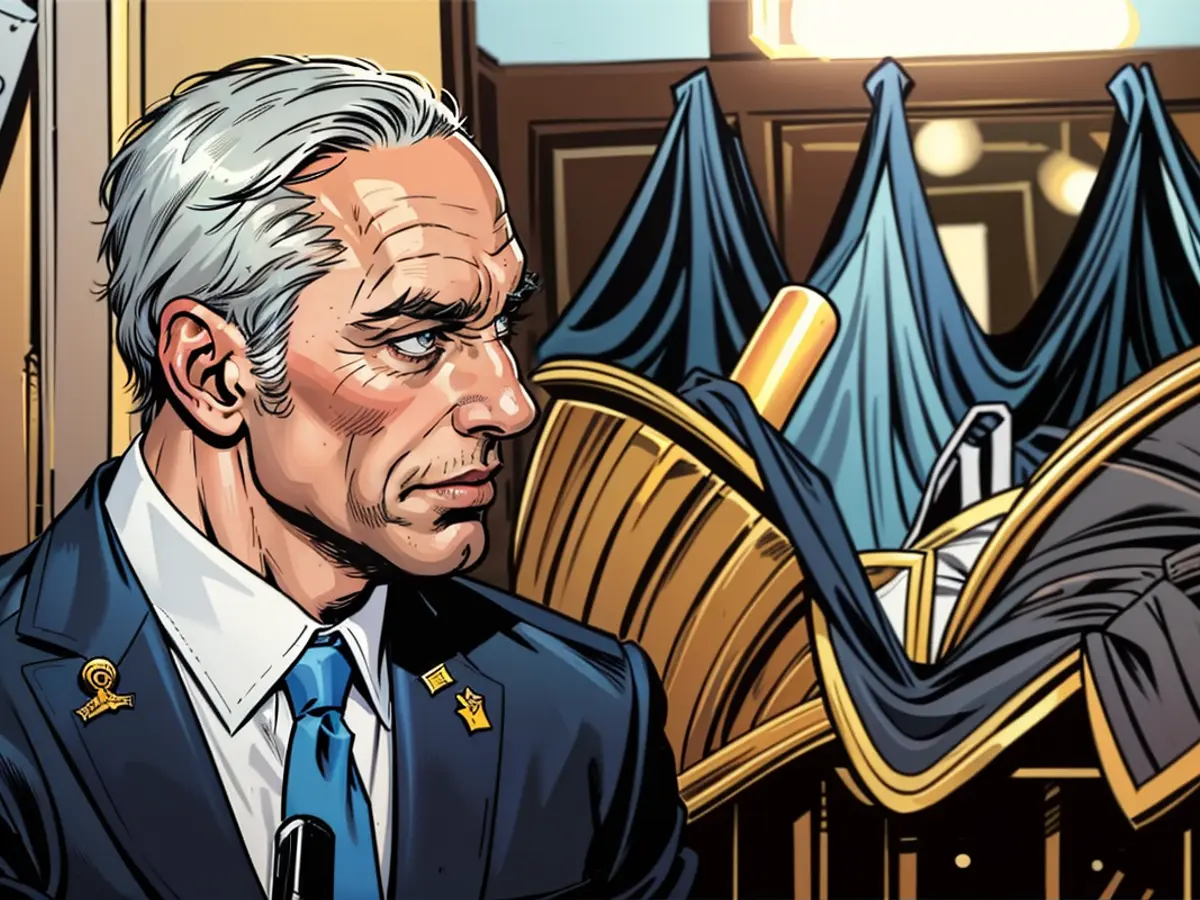"Trust in Benjamin Netanyahu is at a low point"
Israel has killed several high-ranking terrorists, Iran threatens "retaliation". But Tehran's plans are "hard to predict", says Israeli historian Uriel Kashi in an interview. He talks about preparing for a possible attack, the role of Hezbollah - and the course of Prime Minister Benjamin Netanyahu.
ntv.de: Do you expect a larger attack by Iran and its allies than in April?
Uriel Kashi: The April attack was already extremely massive, with hundreds of drones, cruise missiles, and ballistic rockets fired at Israel within a short period. This attack could have had much more serious consequences without the advanced Israeli missile defense system, especially the Arrow-3 and David's Sling systems, which were partially deployed for the first time. Additionally, there was support from friendly US, British, French, and Jordanian air forces.
How did you experience this attack?
Initially, we were very scared because Iran has significantly larger military capabilities than groups like Hezbollah or Hamas. The army had warned us beforehand that there would be a massive barrage that night, so we stayed awake. At 2 am, the rocket alarm went off, and we quickly went to our shelter in the basement. The noise of the defense system was deafening, something I've never experienced before. After the all-clear was given and it was clear that no more rocket fragments would fall, we went back home and tried to sleep.
What do you expect from Iran's announced "retaliation" and allied militias?
The current plans of Iran are hard to predict. Theoretically, there could be another massive rocket barrage. But many analysts expect a more surprising action. This could be an attempt to assassinate a high-ranking politician or military figure, or the destruction of a drilling platform at one of the gas fields. A large-scale cyberattack is also possible.
Do you expect further escalation towards a war against Hezbollah in Lebanon?
This formulation is somewhat misleading, as we are already in a state of war. In recent weeks, Hezbollah has nearly daily attacked Israel with dozens of rockets. Tens of thousands of residents in northern Israel, including almost 24,000 people from the city of Kiryat Shmona, were evacuated from the border region after October 7 and could not return to their homes. At the same time, Israel has attacked Hezbollah positions, which also led to massive evacuations in southern Lebanon.
Nevertheless, it is spoken of a "low flame" war, as both sides are careful not to cause too much damage. Lebanon itself is economically and politically strongly affected, regardless of the conflict with Israel. There are many voices there that clearly tell Hezbollah that they do not want to risk a large war.
What role does Hezbollah play for Iran?
We assume that Iran primarily uses Hezbollah as a deterrent against possible attacks on its nuclear program. A significant weakening of Hezbollah through a large-scale war would therefore be unfavorable for Iran. Nevertheless, the situation remains tense, as shown by Hezbollah's rocket attack on July 27, which killed twelve children and youth in the Druze village of Majd al-Shams. It is unlikely that this was intentional, but Israel was forced to react. The targeted killing of Fuad Shukr, a leading terrorist and close advisor to Hezbollah chief Hassan Nasrallah, was a clear signal to hold back. However, misguided attacks like Hezbollah's can quickly escalate the conflict, even if neither side wants this.
Is there willingness among the Israeli population to accept a larger war?
The fear of a larger war against Hezbollah is great. Such a conflict would come with significant losses, as Hezbollah has more advanced weapon systems than Hamas in the Gaza Strip. Israel's defense could be pushed to its limits, and critical infrastructure such as power and water supply and telecommunications could be destroyed. A larger war could also claim thousands of lives on the Israeli side. However, there is willingness to accept further escalation if the survival of the State of Israel is at stake. And the threat from the so-called Iranian axis is perceived as existential.
Israel is on high alert - how does this affect the lives of the people?
The general mood is tense. Many flights to and from Israel have been canceled, reservists are being called up again. Many Israelis are traumatized and war-weary, they wish for an end to this war. This decision, however, does not lie solely with the Israeli leadership, but also with Hamas, Hezbollah, and Iran. Nevertheless, many people in Israel try to maintain their daily lives as normally as possible. The beaches of Tel Aviv were still well-visited yesterday during the day, but much emptier than usual in the evening.
And how are people preparing for possible attacks from Iran and militias?
Preparations are varied. Space has long been created in air-raid shelters and they have been equipped with food and drinking water. Some families have acquired small generators and battery-operated radios to stay informed in case of an internet outage.
How strong is the support in the population for Prime Minister Benjamin Netanyahu's course?
Trust in the Prime Minister is at a low point. Many people doubt that his decisions are in the best interest of the population. Instead, they see them as attempts to secure his own political position. Normally, there is a certain unity in times of war, but the ongoing mass demonstrations for new elections show deep frustration in the population.
What were the effects when opposition politician Benny Gantz left the war cabinet in June?
The effects of Benny Gantz leaving the war cabinet in June were significant. As a former military chief of staff and head of the Blue and White party, his departure weakened the government's ability to present a united front in the face of the ongoing conflict. It also raised questions about the government's ability to effectively manage the situation, as Gantz's military experience and political influence were seen as valuable assets. Additionally, his departure further highlighted the political divisions within the government and the country as a whole.
A Troubling Trend: The Growing Influence of Far-Right Parties on Israeli Politics
A concerning trend is the increasing influence of far-right parties on Israeli politics. A notable example of this influence was the storming of the military base Beit Lid by Israeli far-right activists, where nine Israeli soldiers, accused of abusing Palestinian prisoners, are to stand trial before a military court. The fact that government members were also involved in this storming and thus undermined the Israeli justice system without facing consequences underscores Netanyahu's weakness within his own coalition.
Is Netanyahu Deliberately Provoking Escalation?
The problem is not just that Netanyahu is provoking escalation, but also that he is blocking possible solutions for a post-war order in the Gaza Strip. Israel cannot fight the "Iranian axis" alone. It requires close cooperation with Western and pragmatic Arab states like Saudi Arabia, Egypt, and the smaller Gulf states. The categorical rejection of the two-state solution by a Knesset resolution last month strains relations with important allies, particularly the USA, where more and more young people are questioning the close bond with Israel. Such resolutions also prevent increased engagement from states like Saudi Arabia, which could play a crucial role in establishing a new security order in the region.
What Role Does the Hostage Rescue Play in the Public Debate?
The hostage rescue is a central topic in the public debate in Israel. The abducted hostages are omnipresent, their images can be found at bus stops, in shop windows, on garden fences, and school walls. As Israel is a small country, almost everyone feels personally affected. Often, one knows someone who is indirectly affected. The hope of getting as many hostages back alive is thus felt as a moral obligation.
And Is This Also Realistic?
The negotiations for the release of the hostages are extremely complex and opaque. Netanyahu accuses Hamas of preventing a ceasefire with unrealistic demands. Simultaneously, he is accused by the USA and even within his own government of creating new obstacles to prevent an agreement with Hamas. Despite the difficult negotiating situation, a majority of Israelis are ready to agree to a deal for the release of the hostages, even if it might not be acceptable under other circumstances.
Lastly, the Debate Over Military Assistance from Germany to Israel - What Could This Look Like?
Israel is in an existential threat situation. Personally, I feel it is legitimate and even right to put pressure on the Israeli government to show more compromise towards the Palestinians, for example, through sanctions against radical Israeli settlers in the occupied West Bank. At the same time, it is necessary to support Israel in its fight against the threat from Iran and its Islamic allies. This support could also be military, to strengthen Israel in its defense.
Questions by Markus Lippold
In light of the aforementioned tensions and the threat of "retaliation" from Iran, many Israeli citizens are expressing concerns about a potential large-scale war with Israel. The ongoing mass demonstrations for new elections in Israel illustrate the deep frustration and dissatisfaction with Prime Minister Benjamin Netanyahu's leadership and perceived actions.
Given Iran's significant military capabilities and the destructive nature of the April attack, the possibility of a more unpredictable and surprise action from Iran or its allies, such as an attempt to assassinate a high-ranking politician or military figure, is a legitimate concern for Israel's security.









